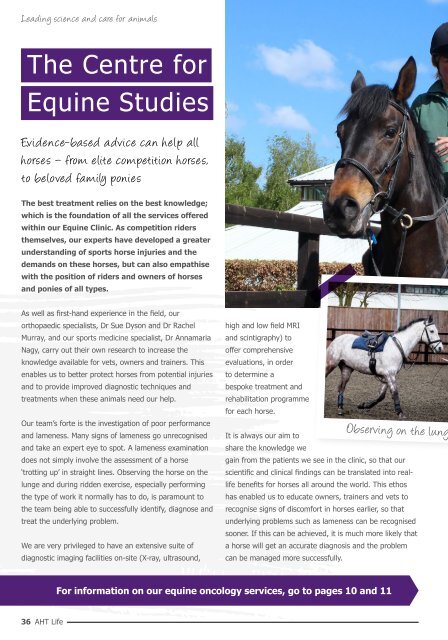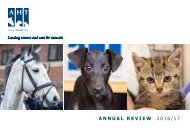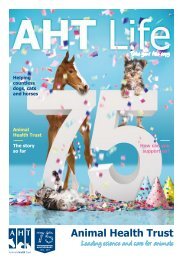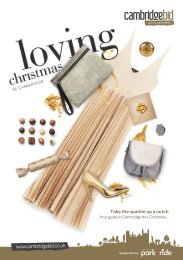AHT Life Magazine 2018
You also want an ePaper? Increase the reach of your titles
YUMPU automatically turns print PDFs into web optimized ePapers that Google loves.
Leading science and care for animals<br />
The Centre for<br />
Equine Studies<br />
Evidence-based advice can help all<br />
horses – from elite competition horses,<br />
to beloved family ponies<br />
The best treatment relies on the best knowledge;<br />
which is the foundation of all the services offered<br />
within our Equine Clinic. As competition riders<br />
themselves, our experts have developed a greater<br />
understanding of sports horse injuries and the<br />
demands on these horses, but can also empathise<br />
with the position of riders and owners of horses<br />
and ponies of all types.<br />
As well as first-hand experience in the field, our<br />
orthopaedic specialists, Dr Sue Dyson and Dr Rachel<br />
Murray, and our sports medicine specialist, Dr Annamaria<br />
Nagy, carry out their own research to increase the<br />
knowledge available for vets, owners and trainers. This<br />
enables us to better protect horses from potential injuries<br />
and to provide improved diagnostic techniques and<br />
treatments when these animals need our help.<br />
Our team’s forte is the investigation of poor performance<br />
and lameness. Many signs of lameness go unrecognised<br />
and take an expert eye to spot. A lameness examination<br />
does not simply involve the assessment of a horse<br />
‘trotting up’ in straight lines. Observing the horse on the<br />
lunge and during ridden exercise, especially performing<br />
the type of work it normally has to do, is paramount to<br />
the team being able to successfully identify, diagnose and<br />
treat the underlying problem.<br />
We are very privileged to have an extensive suite of<br />
diagnostic imaging facilities on-site (X-ray, ultrasound,<br />
high and low field MRI<br />
and scintigraphy) to<br />
offer comprehensive<br />
evaluations, in order<br />
to determine a<br />
bespoke treatment and<br />
rehabilitation programme<br />
for each horse.<br />
It is always our aim to<br />
share the knowledge we<br />
Observing on the lung<br />
gain from the patients we see in the clinic, so that our<br />
scientific and clinical findings can be translated into reallife<br />
benefits for horses all around the world. This ethos<br />
has enabled us to educate owners, trainers and vets to<br />
recognise signs of discomfort in horses earlier, so that<br />
underlying problems such as lameness can be recognised<br />
sooner. If this can be achieved, it is much more likely that<br />
a horse will get an accurate diagnosis and the problem<br />
can be managed more successfully.<br />
For information on our equine oncology services, go to pages 10 and 11<br />
36<br />
<strong>AHT</strong> <strong>Life</strong>





